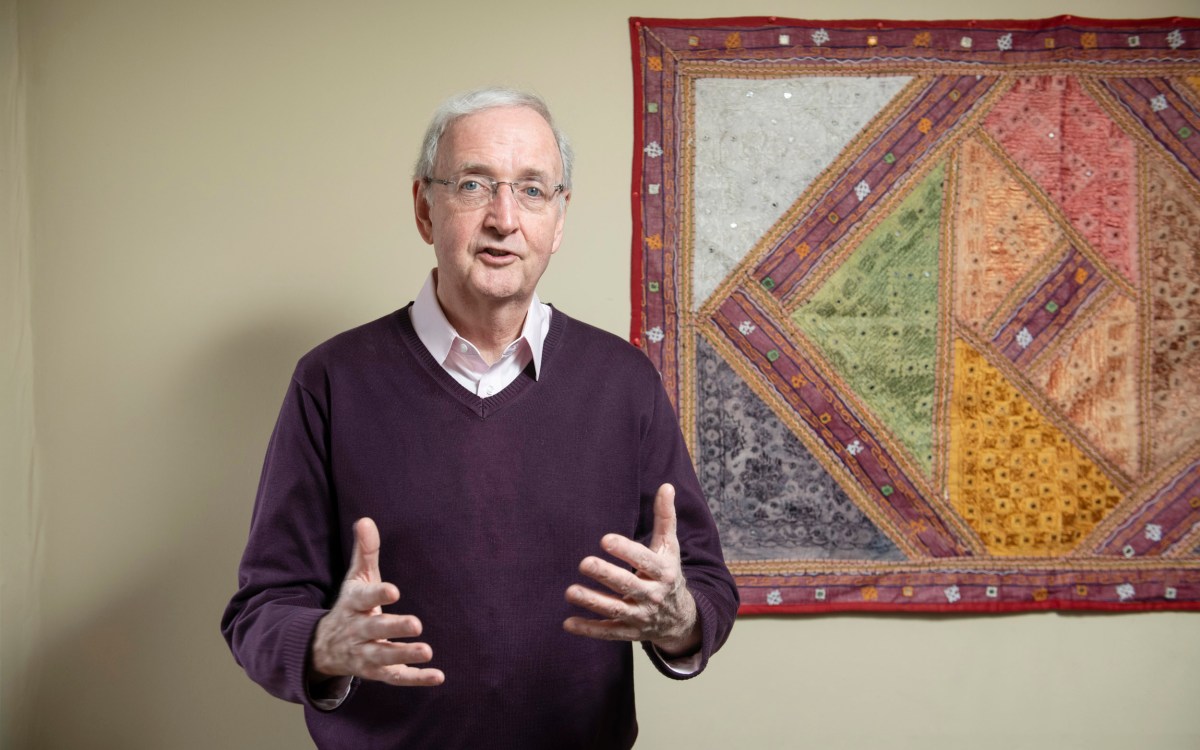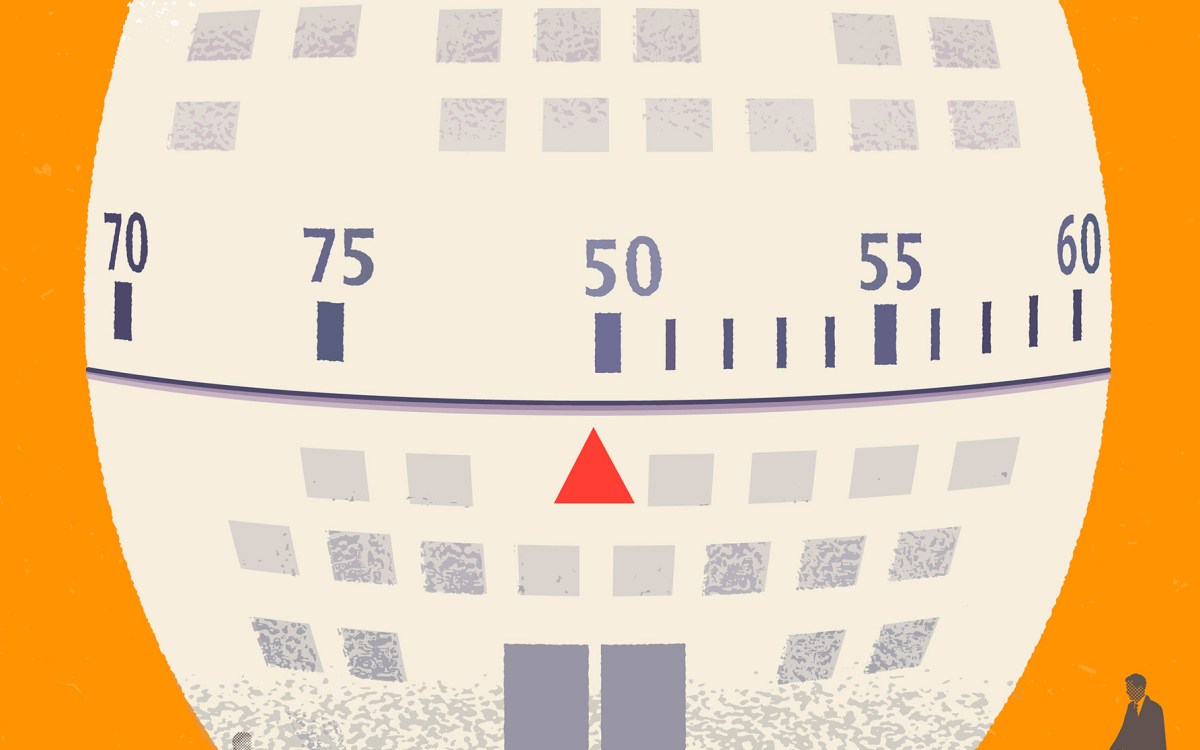
Social Security, Medicare far from doomed, policy expert says
In fact, Louise Sheiner of Brookings Institution wishes we’d make needed fixes, turn attention to investing more in children
Is all the doomsaying on Social Security and Medicare a bit premature? A number of experts say yes, but the issue is complex. Both programs are often portrayed as standing on financially unstable ground. The population of those 65 and older is surging, and it’s raising concerns about whether proceeds from payroll taxes paid by younger workers will be able to keep pace. Financial projections from the Congressional Budget Office show the programs flirting with peril as reserves dwindle in the near future.
But they are just that: projections. To get a little more context on the issue, the Gazette spoke with Louise Sheiner, who received her undergraduate degree from Harvard in ’82 and a Ph.D. in economics in ’93. She’s also a senior fellow and policy director for the Hutchins Center on Fiscal and Monetary Policy at the Brookings Institution. This interview has been edited for length and clarity.
Q&A
Louise Sheiner
GAZETTE: There are a lot of people out there talking about the unsustainability of Social Security. What are we seeing right now that leads them to that conclusion?
SHEINER: The Social Security Administration and the Congressional Budget Office do projections of both sides of the Social Security balance, which is 1) what money is coming in, and 2) what money is going out. The money that comes in mostly comes from payroll taxes. The money coming out is set by a formula based on how many people are eligible and what their wages were, among other things. So the fundamental driver of the issues we’re seeing in the projections is population aging. What’s happening is that workers — the ones paying the taxes — are a generation younger than the beneficiaries. Because the Baby Boomers are a big generation, followed by smaller generations, it means that for any given payroll tax, there’s not enough revenue to pay the benefits. This gets the system into financial difficulty. It’s not coming from the fact that Social Security benefits have gotten really generous. It’s really a structural change in the economy that makes it difficult to sustain. Now, there is something called the Trust Fund, which creates some cushion. But that’s what’s expected to be depleted, based on current projections, after 2034.
GAZETTE: What happens then?
SHEINER: Does it mean that Social Security goes belly-up? No. It’s actually not clear what happens. There are two laws that are in conflict with each other. One law is that you get your Social Security benefits based on your top 35 years of earnings. But then the other law says if the money is not available, it can’t be paid out. So what happens? Let’s say the amount coming in is enough to pay 75 percent. Does everybody get 75 percent, or just a few? Nobody really knows. Most people think Congress will do something to address this. But there’s a big question about what to do when you’ve had a structural change in the economy, coming from population aging. Baby Boomers are retiring, and some people are acting like it’s a one-time thing. But so many factors will affect the future: fertility rates, life expectancy, how many kids someone has, how many old to middle to young workers there are. It’s always a projection, but trends are not going in the direction of going back to three kids, right? So we think it’s going to be a permanently older economy.
GAZETTE: How could that be addressed?
SHEINER: There are a number of things we could do: If people live longer, they can work longer; you could cut benefits; or you could raise taxes, which wouldn’t have to be a massive change. And obviously, the Democrats are on the side of raising taxes, and the Republicans are on the side of cutting benefits. Eventually, some combination is likely to result.
“There are two laws that are in conflict with each other. One is that you get your Social Security benefits based on your top 35 years of earnings. The other says if the money is not available, it can’t be paid out.”
GAZETTE: Having worked in this space for a long time, did going through the pandemic change your thinking on this issue?
SHEINER: One of the things that happened at the beginning of the pandemic is that people were worried that [the economic and employment fallout] were going to accelerate the depletion of the Social Security Trust Funds. That didn’t happen. The economy did a lot better than people thought it would. There was a lot of mortality, which, unfortunately, helped shore up Social Security. But people did recognize that we are in a situation now where it’s precarious. The more the Social Security Trust Fund gets withdrawn, the more we’re worried about having to do something that won’t put these benefits at risk. We don’t want to get to a point where we suddenly have to act quickly, and people aren’t sure if they’re going to get their benefits.
GAZETTE: Some people think that programs like Social Security and Medicare should be totally gutted or at least reformed heavily. Does it seem inevitable that this is going to happen?
SHEINER: I don’t think it’s inevitable. It’s not the case for Social Security that spending has grown because of inefficiencies. The social credit benefits are not hugely generous. They’re helpful, but it’s not a case of spending gone wild. The problem is a structural change in the economy. Now, Medicare is a whole different issue, because Medicare is not just a provision of money, but the provision of health services. And we know that we’ve had very rapid growth in health spending for decades in this country. We spend a lot of money relative to other countries on health. Some people would say we should just gut Medicare and go through universal health care and completely revamp the system. But we’re not anywhere close to doing that, and how to get from here to there is really uncertain. I do think there will be reforms to Medicare, as there have been decade after decade after decade. In fact, Medicare spending growth has really been quite moderate in recent decades, to some extent, because of reforms that have happened.
GAZETTE: I recently read an opinion piece by Paul Krugman which suggested that Medicare and Social Security are not as unsustainable as people think. Do you think the projections put a gloomier spin on the situation than necessary?
SHEINER: I think the people who do the projections are trying to be balanced. Things may not be as bad as they predict, but they may be worse, right? I think a hard question is: What do you do when your policy has a lot of uncertainty? And people have different views on that. One approach is you should prepare for the worst-case scenario. Another is, no, let’s not cut benefits just because we think we might be in trouble in the future. I think I’m somewhere in between, which is: There’s a lot of uncertainty, so I would like to protect benefits, especially for lower-income people. I think there’s a lot we can do on the tax side. And figuring out a way to make the health system more efficient would have huge benefits all around. It would help people; it would help the budget; it’s a big deal. That should be a high priority.
GAZETTE: A Brookings article talked about how seniors are actually “the wealthiest age cohort in the world.” How does that affect the need for programs like Social Security?
SHEINER: You could make a decent argument that for higher-income people, they don’t need Social Security, they don’t need Medicare, or they could pay more for it. But one of the things that people have liked about Social Security and Medicare is that they’re universal programs. Everybody has a stake in it. But that’s not an economic argument. It’s a political argument: Do you want to preserve this program that everybody has, or do you want to make it more of a safety-net program?
GAZETTE: What should we be looking to do to shore things up right now as well as in the longer term?
SHEINER: For the long term, at least with Medicare, we need to continue experimenting with different reforms and try to increase the efficiency. That’s something we should be doing regardless of whether or not we had any kind of sustainability issue. If we can save money and make something more efficient, it’s clearly worth it. In terms of now versus later, I think it comes back to politics. Personally, I think we have bigger problems in our country than the sustainability of Social Security and Medicare. I think we can raise taxes for now and worry about the other things a little bit later. I would rather not focus on cutting benefits and raising taxes. I would like to focus on improving equality by investing in kids.
GAZETTE: If I’m someone who’s approaching retirement or thinking about retirement, what are practical steps I could take to set myself up or my family for success?
SHEINER: The best thing you can do is not retire too early. Delaying retirement has very big benefits. You get extra work in and increase your savings; you get bigger Social Security benefits to make up for the fact that you didn’t get it earlier. To the extent you can delay retirement, it really is the best thing that you can do.
GAZETTE: Are there areas of political common ground that give you hope?
SHEINER: Social Security and Medicare are popular programs, which makes me think that we will come around to solutions like raising taxes, shaving benefits a little bit here and there. But we won’t completely gut the programs. We’ll kick the can down the road a little, and I think that’s OK. I think we will eventually make that progress.







